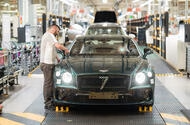UK-made vehicles are set to benefit from a significant reduction in tariffs for exports to the United States, thanks to a recent announcement from President Donald Trump. The new tariff rate will be 10% for the first 100,000 cars exported from the UK, a notable decrease from the previously proposed 25%. This change comes after extensive negotiations between British and American officials, aimed at easing trade tensions and fostering stronger economic ties.
What Does This Tariff Reduction Mean for UK Car Manufacturers?
The implications of this tariff reduction are substantial for the UK automotive industry. Last year, the UK exported over 102,000 cars to the US, making it the second-largest market for British-made vehicles after the EU. The reduction in tariffs is expected to provide much-needed relief to manufacturers, allowing them to maintain competitiveness in a crucial market. Prime Minister Keir Starmer hailed the 10% rate as a “huge and important reduction,” indicating that there may be room for further negotiations to increase the quota beyond 100,000 cars.
Industry leaders are optimistic about the potential for growth. Mike Hawes, the head of the Society of Motor Manufacturers and Traders, emphasized that this agreement is a positive development for both the industry and consumers. The previous tariff threat posed a significant risk to UK automotive exporters, and this new deal allows them to approach the future with renewed confidence.
How Will This Impact Specific Brands?
For brands like Jaguar Land Rover (JLR), which exported around 130,000 cars to the US last year, this tariff reduction is particularly welcome. JLR had paused shipments to the US in response to the uncertainty surrounding the new tariffs, but with this agreement, they can resume operations with greater certainty. JLR CEO Adrian Mardell noted the importance of the automotive sector to the UK economy, highlighting that it sustains approximately 250,000 jobs.
Mini, another key player in the UK automotive market, will also benefit from this development. The Mini Cooper hatchback, manufactured in Oxford, has seen a surge in US sales this year. However, the Mini Countryman, which is produced in Germany, remains subject to the higher 25% tariff, illustrating the complexities of international trade agreements.
What’s Next for Tariff Negotiations?
While the 10% tariff is a step in the right direction, details regarding the proposed 25% tariff on car parts remain unclear. As negotiations continue, the focus will also shift to other trade agreements, including those involving food, chemicals, and machinery. The UK is the first nation to reach an agreement with the US following Trump’s tariff announcement, setting a precedent for future negotiations with other countries, including China.
The broader context of these tariff changes reflects ongoing efforts by the US to address trade imbalances and promote domestic manufacturing. Trump has framed this deal as a breakthrough in trade relations with one of America’s closest allies, emphasizing the need for fairer trading practices.
The big takeaway? This tariff reduction isn’t just about numbers; it’s about fostering relationships and ensuring the sustainability of the UK automotive industry. As manufacturers adapt to these new terms, the focus will be on leveraging this opportunity for growth and innovation. Start with one change this week, and you’ll likely spot the difference by month’s end.

